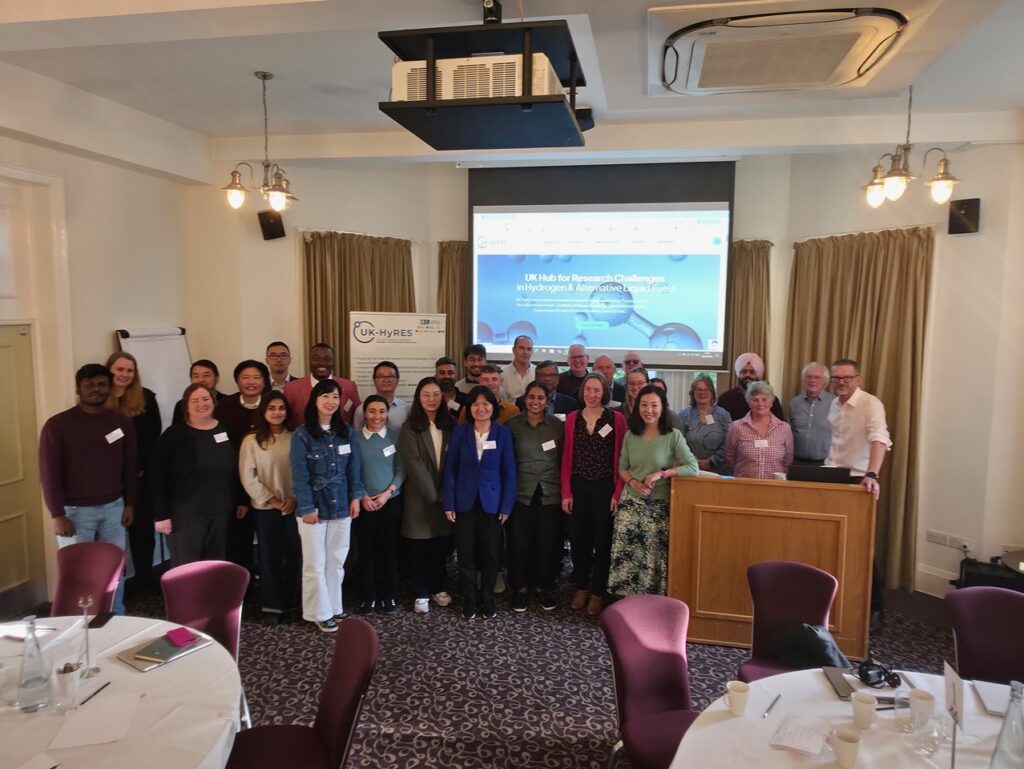The UK-HyRES All Hands Meeting, held in Sheffield on 25 – 26 September 2025, brought together academics, researchers and PhD students from across the Hub. The two-day event provided an opportunity to celebrate achievements from the past 2.5 years, reflect on progress, and discuss strategic directions for the next phase of research and collaboration to tackle the research challenges blocking the wider use of hydrogen and alternative liquid fuels in the necessary transition from fossil fuels. It allowed technical researchers time to reflect on the impact of their work through the lens of cross-cutting themes such as environmental impacts, safety, economics and social considerations. This provided a wide backdrop to ensure that the Hub’s research remains relevant and impactful.

Day 1: Advancing Hydrogen Innovation Across Themes
The first day focused on theme-based discussions spanning hydrogen production, storage & distribution, end use, and alternative liquid fuels, social and environmental impacts, the economics of alternative fuels and safety.
Identified challenges needing focus included:
- The need for clear reporting and management frameworks, and stronger supply-chain resilience, particularly in UK-based materials and manufacturing.
- Ongoing system testing challenges and the development of catalysts and fuels such as methanol, ammonia, and urea.
- A shared emphasis on early life cycle assessment and addressing environmental and ethical considerations, including forever chemicals, mining impacts, leakage, and water use.
- Integrating safety considerations at low technology readiness levels (TRLs) to prevent costly retrofit in later stages.
Economic analysis and public engagement were identified as key enablers to the wider use of hydrogen as an alternative fuel, with emphasis on techno-economic assessments, scaling from kW to MW systems, and transparent communication with stakeholders.
Safety discussions focused on scaling risks, regulatory barriers, catalyst hazards, and ammonia toxicity, while social and policy discussions examined public perception, insurance, education, and the importance of demonstration projects to build trust in hydrogen technologies.
Day 2: Exploring Pink Hydrogen and Nuclear Integration
The second day turned to “pink” or nuclear enabled hydrogen. The Hub’s researchers were joined by the UK National Nuclear Laboratory. Delegates discussed how existing plans for future nuclear deployment could be leveraged to accelerate hydrogen production, as well as potential technology coupling and the need to make a clear safety case, noting that small modular reactor (SMR) deployment is likely to occur in the 2030s.
Discussions also considered availability of fresh water as most nuclear plants were based near the sea so utilising desalinated water for hydrogen production would be needed unless brown water could be utilised.
Plans were mapped out for a focused technical workshop in the new year, bringing people from multiple disciplines and stakeholder communities together, with details of the workshop and save the dates to be issued in the near future.
Translational Research and Policy Impact
In the closing session, participants focused on translating research into real-world applications and influencing policy.
Key opportunities included:
- Catalyst discovery, ammonia cracking, NOx removal, and the development of demonstrator sites.
- Strengthening industrial partnerships.
- Advocating for consistent funding models across technology readiness levels (TRLs).
For policy engagement, delegates emphasised the importance of clear roadmaps, impact metrics (jobs, economics), white papers, and training materials, along with the need to coordinate engagement with key influencers, including MPs, Chief Scientific Advisers, and regulatory bodies.
Looking Ahead
The 2025 UK-HyRES All Hands Meeting underscored the Hub’s growing role as a national catalyst for wider use of hydrogen as an alternative energy vector, uniting diverse expertise to address technical, economic, environmental and societal challenges. As UK-HyRES moves into its next phase, participants left Sheffield with reinforced understanding of the focus for the second half of the Hub’s work in meeting the challenges to allow for greater use of alternative fuels to achieve our Net Zero targets. The Hub is ready to translate research into impact, strengthen industrial partnerships, and inform policy for an economically viable, socially acceptable and sustainable hydrogen future.